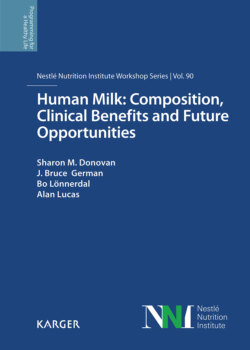Читать книгу Human Milk: Composition, Clinical Benefits and Future Opportunities - Группа авторов - Страница 8
На сайте Литреса книга снята с продажи.
Foreword
ОглавлениеHuman milk presents the optimal nutrition for infants and is key to sustaining health and building the foundation for growth and cognitive development. The World Health Organization (WHO) recommends that infants should be exclusively breastfed for the first 6 months of life and subsequently receive suitable complementary foods while breastfeeding continues up to 24 months of age or beyond.
The global initiative to encourage breastfeeding for all infants worldwide represents one of the most significant public health interventions. It is therefore critical that any guidance to support breastfeeding is evidence-based.
Rapidly advancing technology has allowed us a closer look at the different components of human milk and shed light on their biological effects on growth, metabolism, cognition, and immunity. This new knowledge is constantly enriching our picture of how human milk sets the foundation for health in later life. Yet, researchers face many challenges in their quest to unravel its complexities. An understanding of human milk is inextricably linked to an understanding of the biology of the growing infant. Any clinical study that aims to elucidate the effects of a specific element in human milk must overcome the double hurdle of design and outcome: how can we test such a complex substance or extract a meaningful endpoint from the intricacies of infant development? Success relies in part on obtaining a cohesive body of in vitro, in vivo, and clinical data.
The 90th Nestlé Nutrition Institute Workshop brought together the world’s experts on human milk, chaired by Prof. Sharon M. Donovan (Professor and Melissa M. Noel Endowed Chair in Nutrition and Health, Department of Food Science and Human Nutrition, Carl R. Woese Institute for Genomic Biology, University of Illinois), Prof. J. Bruce German (Director, Foods for Health Institute, University of California, Davis), Prof. Bo Lönnerdal (Distinguished Professor Emeritus, Department of Nutrition and Internal Medicine, University of California, Davis), and Prof. Alan Lucas (MRC Clinical Research Professor and Head of the Childhood Nutrition Centre, Institute of Child Health, University College London). The four sessions in the workshop touched on the full spectrum of our knowledge of human milk, from the history and mechanics of breastfeeding, its physiological effects, to the new surprises revealed by metabolomics and comparative biology.
Although it is well accepted that the early years of a child’s life are critical for growth and development, we have little mechanistic understanding of how the infant diet shapes short-term and long-term health. One of the key learnings in this workshop is that human milk is not only a source of essential nutrients, but also contains a variety of bioactive substances. These include essential microbes, long-chain fatty acids, complex oligosaccharides, nucleotides, and bioactive signaling proteins and hormones.
We are only just beginning to glimpse at how these components protect against infections, regulate infant development, and modulate long-term out-comes. A deeper understanding of the function of human milk will also help to enhance outcomes in vulnerable populations, including premature infants, those with low birthweight, and infants with special dietary needs.
We would like to thank the four Chairpersons Sharon M. Donovan, J. Bruce German, Bo Lönnerdal, and Alan Lucas for putting the scientific program together.
We also would like to thank all speakers and scientific experts in the audience, who have contributed to the workshop content and scientific discussions. Finally, we thank Christine Stillhart and the NNI teams for their logistic support.
Dr. Natalia Wagemans
Head of Nestlé Nutrition Institute
La Tour-de-Peilz, Switzerland
